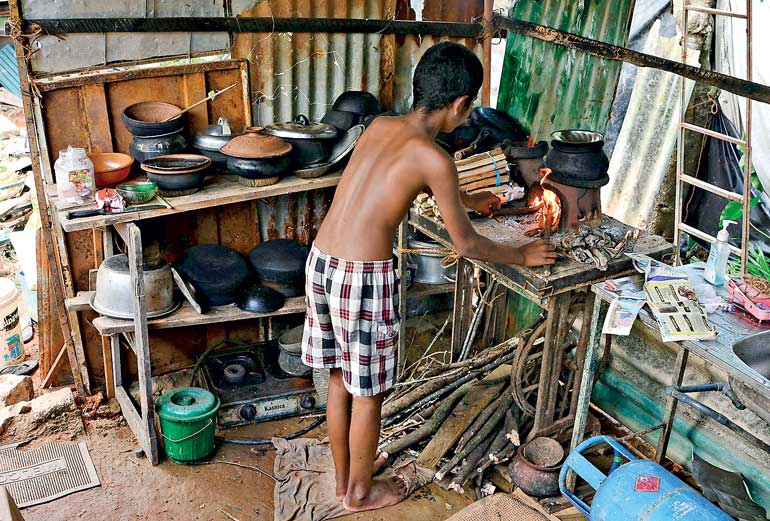Monday Feb 16, 2026
Monday Feb 16, 2026
Tuesday, 5 April 2022 03:00 - - {{hitsCtrl.values.hits}}

By the time all this is done, it will be July 2022. We will be out of fuel, with a few hours of electricity and cooking with firewood – Pic by Shehan Gunasekara
Ask anyone who has come on to the roads to protest what caused them to take this step. The answer will be about the interminable and unfair power cuts; the lack of fuel for vehicles; the shortages of gas cylinders; the rapid rise in the cost of living.
Udaya Gammanpila seems to think that the solution to the present crisis is in two parts: pass a Constitutional Amendment to make it impossible for Basil Rajapaksa and other dual citizens to serve as MPs (and in other important positions); dissolve Parliament and hold a General Election. He and Wimal Weerawansa are seeking to replace the present Cabinet under the President and go for a quick election to stanch the losses they see coming.
The former is puerile. He made no such protests when Basil Rajapaksa was a cabinet minister before 2015, or when in alliance with the political party formed by the dual citizen. He voted for the 20th Amendment which lifted the prohibition against dual citizens in Parliament. The petulant Gammanpila may want revenge for being thrown out of Cabinet. But an entire Constitutional Amendment just for that seems overkill.
The latter proposal to call a general election at this stage of the crisis demonstrates that he has little understanding of the nature of the unprecedented crisis we are in. As shortsighted politicians have repeatedly done, he is prioritising political considerations over the welfare of the people.
What are the immediate problems that need to be solved?
A $ 1,000,000,000 International Sovereign Bond must be paid in full on 25 July 2022, leaving aside various bilateral and multilateral loan payments. Double the amount that was paid in January 2022 has to be paid as a lump sum in less than three months. Whether or not elections have been called, whether there is a government in place or not, this payment must be made unless the restructuring process has made headway by then. If it is not, Sri Lanka will enter a condition of disorderly default, described by the Financial Times as “almost as bad as civil war.” To see the results of disorderly default, anyone can look at the situation in Lebanon after March 2020.
Since the last quarter of 2019 (three months prior to the disorderly default), the Lebanese pound lost 90% of its value, and annual inflation in 2020 was 84.9%. According to government statistics as of June 2021, prices of consumer goods had nearly quadrupled over the previous two years. All but the wealthiest Lebanese have cut protein from their diets and wait in long lines to fuel their cars, and suffer through extended power cuts. The price of electricity is nearly 10 times what it was before the crisis began. Those with generators are increasingly unable to pay for the fuel.
Across Lebanon, fuel shortages have led to long lines at gas stations, where drivers wait for hours to buy only a few litres, or none if the station runs out. The supply of medicines has become unreliable. Painkillers and blood pressure medications are difficult to find. Other products have disappeared altogether, such as drugs to treat depression. Insulin is hard to find. People pay seven times as much as they paid two years ago for baby formula.
When I first spoke/wrote about Lebanon four months ago, the above narrative appeared dystopian. Government apologists responded to my warnings saying: “ordinary people . . . will be alarmed but deep within they would know that there is no use in comparing us to Lebanon. They will know that there have been Cassandras who say scary things and that they have been in business for a long time.” Those suffering without power for hours can use that time to decide who was right. Rajpal Abeynayake should get his tropes right. Cassandra made accurate prophecies. The Kingdom of Troy would have been saved if she was believed.
Sri Lanka needs to avoid a disorderly default. Our people need medicines, food, gas to cook with, fuel for transport and for electricity generation. The only way to achieve these objectives is expeditiously enter into parallel negotiations with the IMF and with the ISB holders. These actions must commence within the next two weeks, according to Shanta Devarajan, the former acting Chief Economist of the World Bank.
Effects of a general election
Assume the Government gets its act together in April, sends officials to negotiate with the IMF and retains a specialised law firm to negotiate with the bond holders. As these processes are underway, the elections that Gammanpila wants are called. The negotiations would be immediately suspended. There would be no credible party on the Sri Lankan side to negotiate with (it should also be noted that any kind of military takeover will have the same effect).
Assuming the Election Commission finds the paper and fuel stocks needed print ballot papers and send thousands of officials across the country, the election may be held in June. The last one cost more than Rs. 7 billion. Most likely, the Government would supply the billions that are required through another bout of money printing which will probably tip us over into a hyper inflationary spiral.
There is no guarantee that the new set of MPs will be superior to the current set. The 20th Amendment will still be in place, giving the current President extraordinary powers to appoint the Cabinet. If the new Parliament is dominated by those opposed to him, there will be a dragged-out struggle, worse than what happened in 2001. By the time all this is done, it will be July 2022. There will be no money to pay for imports; no money for the bond repayment.
We will be out of fuel, with a few hours of electricity and cooking with firewood. And in disorderly default. Letters of credit cannot be opened. Exports will die. Goodbye to tourism. Farewell to middle-income status. The World Bank, in an unusually hard-hitting assessment published in February of this year, described the severity of the crisis in Lebanon as one of the top ten, possibly top three most severe economic collapses worldwide since the 1850s. Lebanon’s GDP plummeted from close to $ 52 billion in 2019 to a projected $ 21.8 billion in 2021, marking a 58.1 percent contraction—the highest contraction in a list of 193 countries. Sri Lanka would be in competition, if we go into disorderly default in July.
The way out
Gammanpila-Weerawansa point the way to certain disaster. Those who may be tempted, for various reasons including the desire to be rid of the Rajapaksas, to follow their siren call must be dissuaded. We must work with and through the current Parliament.
The first and essential pre-condition is to rescind the disastrous 20th Amendment. If possible, the flaws in the 19th Amendment should be fixed, but there is no alternative to reducing the enormous powers vested in the President by this misbegotten Amendment. In the process, the President will lose whatever legitimacy he now has, and the individual MPs will start behaving as representatives of the people, and not as “signal posts to raise our hands to laws made elsewhere” as stated by Susil Premajayantha upon being fired as a state minister.
Once the 20th Amendment is rolled back, the President will no longer be able to appoint who he wants as Prime Minister and to dissolve Parliament any time after February 2023. The illegitimate appointments made to independent commissions made at his sole discretion will be nullified and fresh appointments can be made, ensuring free and fair elections and effective prosecution of bribery complaints, among other things.
In this new Parliament, it will be possible to reactivate the oversight committees that were operational in 2015-19. The Oversight Plan assigning various government agencies to 16 committees is still on the Parliament website. This will allow all the MPs to participate in rebuilding the country in a structured manner. Consideration may be given to forming the interim Cabinet from among the Chairs of the oversight committees. This is something Sri Lanka had experience with under the Donoughmore Constitution.
At present, nine sets of proposals have been published, ranging from the 11 parties still within the Government to the National Movement for Social Justice headed by Karu Jayasuriya. In parallel with the reversal of the 20th Amendment it is necessary to reach agreement on a Common Minimum Program among the parties in Parliament supporting the rollback of this pernicious amendment.
Critical reforms to address the twin deficits—the fiscal deficit and the current account deficit—must be implemented by the interim government, without the usual hypocritical sniping from those out of power. This will create confidence among our creditors that we are serious about addressing the root causes of the debt crisis and will set us on the path of recovery.
There is much to be done. But if we seize this opportunity without being enticed by the demagogues, we still have a chance of saving this country.